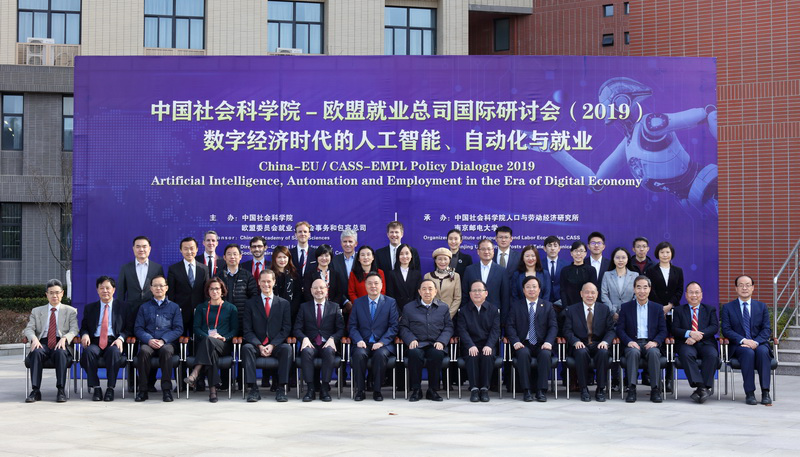The China-European/Chinese Academy of Social Sciences-Employment, Social Affairs and Inclusion Directorate General Policy Dialogue 2019 was held in Nanjing University of Posts and Telecommunications (NJUPT) during 12th to 13th, December. The event was jointly sponsored by Chinese Academy of Social Sciences and European Commission’s Employment, Social Affairs and Inclusion Directorate General, and was co-organized by Nanjing University of Posts and Telecommunications and Institute of Population and Labor Economics of Chinese Academy of Social Sciences.
The theme of this meeting is “artificial intelligence, automation and employment in the era of digital economy”. Nearly 50 experts and scholars in the fields of digital economy development, artificial intelligence, human resources and labor employment attended the meeting. They were from Chinese Academy of Social Sciences, European Commission’s Employment, Social Affairs and Inclusion Directorate General, Central Research Office of Chinese Peasants and Workers Democratic Party, Nanjing University of Posts and Telecommunications, Peking University, Renmin University of China, Zhejiang University, Nankai University, University of California, Davis, Universität Flensburg, Catholic University of Leuven.
The scholars’ focus of discussion was laid on such areas as “the outlook for employment and technology in the era of digital economy”, “employment challenges in the era of artificial intelligence, automation and digital economy”, and “employment policy challenges and responses in digital economy”.
This conference was divided into three phases. The first phase was chaired by Luluís Prats, director of the International Affairs Department of the European Commission’s Employment, Social Affairs and Inclusion Directorate General, and its theme was the outlook for employment and technology in the era of digital economy. Experts who made a keynote speech in this phase included Loukas Stemitsiotis, director of the Thematic Analysis unit of the European Commission’s Employment, Social Affairs and Inclusion Directorate General, Yao Yu, a researcher at the Institute of Population and Labor Economics of Chinese Academy of Social Sciences, and Santo Milasi, an economist of Finance, Innovation & Growth of the European Commission’s Joint Research Centre. The themes of their speeches respectively were “the impact of automation and digitization on global work”, “building a high-quality labor market to meet the challenges of the era of artificial intelligence”, “changes in jobs and skills in the era of digital economy”.
The second phase was respectively chaired by Yao Xianguo, dean and professor of the Public Policy Research Institute of Zhejiang University, and Zhang Zheng, dean and professor of the School Of Continuing Education, Peking University, and its theme was employment challenges in the era of artificial intelligence, automation and digital economy. Experts making a keynote speech in this phase were Patricia Vendramin, professor at Catholic University of Leuven, Hu Yongtai, professor of economics at University of California, Davis and distinguished researcher at the Institute of Population and Labor Economics of Chinese Academy of Social Sciences, Zhao Wen, associate research fellow at the Institute of Population and Labor Economics of Chinese Academy of Social Sciences, Dhondt Steven, senior researcher at the Netherlands Organization for Applied Scientific Research and professor at KU Leuven, Qu Xiaofu, deputy director and associate research fellow at the Institute of Population and Labor Economics of Chinese Academy of Social Sciences, Marcel Smolka, professor at Universität Flensburg. Their speeches respectively focused on “digital transformation: job and career challenges”, “lessons from the decline in US manufacturing employment: the impact of digitization on expected employment”, “What is the difference of income distribution in the new economy”, “European technological change, organizational idea innovation and work practice transformation: 5 years’ experience in panel research”, “effects of robots and automation on wages and employment: empirical evidence from China”, “the impact of robots on enterprises”.
The third phase was respectively chaired by Li Jianming, professor at the School of Economics of Nankai University, and Lluís Prats, director of the International Affairs Department of the European Commission’s Employment, Social Affairs and Inclusion Directorate General, and its theme was employment policy challenges and responses in digital economy. In this phase, keynote speeches were delivered by the following experts: Li Yongjian, director and researcher at National Academy of Economic Strategy, CASS, Franciska Barabás-Kömives, assistant director of the European Commission’s Employment, Social Affairs and Inclusion Directorate General, Gao Wenshu, director and researcher at the Institute of Population and Labor Economics of Chinese Academy of Social Sciences, Wang Dashu, professor at the School of Economics of Peking University, Willem Pieter de Groen, director and researcher at the Centre for European Policy Studies. Their focus of speeches was laid on “new technology and employment: a long-term historical study”, “Eu’s experience in using digital tools to improve employment and labor market”, “the employment effect of the digital economy”, “digital economy and personnel training of digital economy”, “employment and working conditions for different types of platforms”.




